Can You Do Aromatherapy at Home
Feeling stressed, anxious, or in need of a mood boost? Aromatherapy may be the solution you’re looking for.
Discover what aromatherapy is, how it works, and the numerous benefits it offers.
From reducing stress and improving sleep quality to relieving pain and inflammation, aromatherapy has a wide range of benefits.
Learn about the different types of aromatherapy, how to practice it at home, and some popular essential oils to get you started.
If you’re curious about incorporating aromatherapy into your daily routine, keep reading to learn more.
Key Takeaways:
What is Aromatherapy?
Aromatherapy is a holistic healing treatment that uses natural plant extracts, known as essential oils, to promote physical, mental, and emotional well-being. These essential oils are derived from various plant parts through processes like distillation or cold pressing.
Historically, aromatherapy traces its roots back to ancient civilizations like Egypt, India, and China, where fragrant plants were used for their healing properties. The principles of aromatherapy involve harnessing the therapeutic benefits of essential oils to enhance relaxation, improve mood, and alleviate various ailments.
Methods of extraction play a crucial role in preserving the potency of these oils. Distillation, the most common technique, involves steaming plant material to extract the essential oils. Cold pressing is another method used mainly for citrus fruits to obtain their oils.
How Does Aromatherapy Work?
Aromatherapy works by stimulating smell receptors in the nose, which then send messages to the limbic system, the part of the brain that controls emotions and memories. This process triggers various physiological responses in the body, leading to the potential health benefits associated with aromatherapy.
Eucalyptus oil, for instance, when inhaled, can help clear sinuses and improve respiratory function. The powerful scents of essential oils like lavender or chamomile can induce relaxation, reducing stress and anxiety levels. When applied topically, oils like tea tree or peppermint can alleviate skin sensitivities or muscle soreness.
What Are the Benefits of Aromatherapy?
The benefits of aromatherapy include reducing stress and anxiety, improving sleep quality, enhancing mood and energy levels, and relieving pain and inflammation. It is essential to practice aromatherapy safely, considering factors like proper dilution, carrier oils, and individual skin sensitivities.
When using room sprays or creating personalized massage oils, understanding the benefits of different carrier oils is crucial. Popular choices like jojoba, almond, and coconut oils not only dilute essential oils effectively but also offer nourishing properties for the skin. Additionally, aromatherapy can also help in promoting relaxation and focus, making it a versatile tool for both mental and physical well-being. Remember, always perform a patch test before extensive use to ensure compatibility with your skin’s unique needs.
Reduces Stress and Anxiety
Aromatherapy has been shown to be effective in reducing stress and anxiety levels through the calming and soothing effects of essential oils. Oils like lavender, tea tree, and peppermint are commonly used for their stress-relieving properties.
Diffusers play a crucial role in dispersing these aromatic oils into the air, creating a peaceful environment that promotes relaxation. Aromatherapy diffusers come in various forms, such as ultrasonic, nebulizing, and heat diffusers, each offering unique benefits in diffusing the oils efficiently.
Moreover, pulse point rollers infused with essential oils provide a convenient way to apply the oils directly to pressure points on the body, amplifying their calming effects. The gentle massage during the application process can further enhance relaxation and alleviate tension.
Improves Sleep Quality
Aromatherapy can help improve sleep quality by promoting relaxation and creating a restful environment. Lavender essential oil is well-known for its soothing aroma, which can aid in reducing insomnia and enhancing overall sleep patterns.
The sedative properties of lavender essential oil are attributed to its chemical compounds, such as linalool and linalyl acetate, which have a calming effect on the nervous system. When inhaled, these compounds can help lower heart rates and blood pressure, signaling to the body that it’s time to unwind and prepare for sleep.
To maximize the benefits of lavender essential oil for sleep, consider using it in a diffuser before bedtime. Simply add a few drops of lavender oil to water and diffuse the calming mist throughout the room to create a tranquil atmosphere conducive to sleep.
Plus diffusers, incorporating lavender essential oil into bath and body products can also enhance its sleep-enhancing effects. Adding a few drops of lavender oil to your bathwater or mixing it with a carrier oil for a soothing massage can help relax both the body and mind, paving the way for a night of deep and restorative sleep.
Boosts Mood and Energy
Aromatherapy has the potential to uplift mood and boost energy levels through the invigorating scents of oils like orange and lemon. These citrus oils are known for their refreshing and revitalizing effects on the mind and body.
The bright and zesty aroma of citrus essential oils can instantly uplift your spirits and provide a much-needed energy boost, making them perfect additions to your daily routine. The stimulating fragrances of orange and lemon can help create a refreshing and revitalizing atmosphere in your living spaces.
One popular way to harness the mood-lifting benefits of citrus oils is by incorporating them into homemade room sprays. Simply mix a few drops of your favorite citrus oil with water in a spray bottle and spritz it around your home to create an invigorating and rejuvenating ambiance. Can I take aromatherapy?
Another effective method is to blend citrus oils with carrier oils to create pulse point rollers that can be applied to the wrists or temples for a quick energy pick-me-up during the day. This allows you to enjoy the uplifting properties of these oils wherever you go.
Relieves Pain and Inflammation
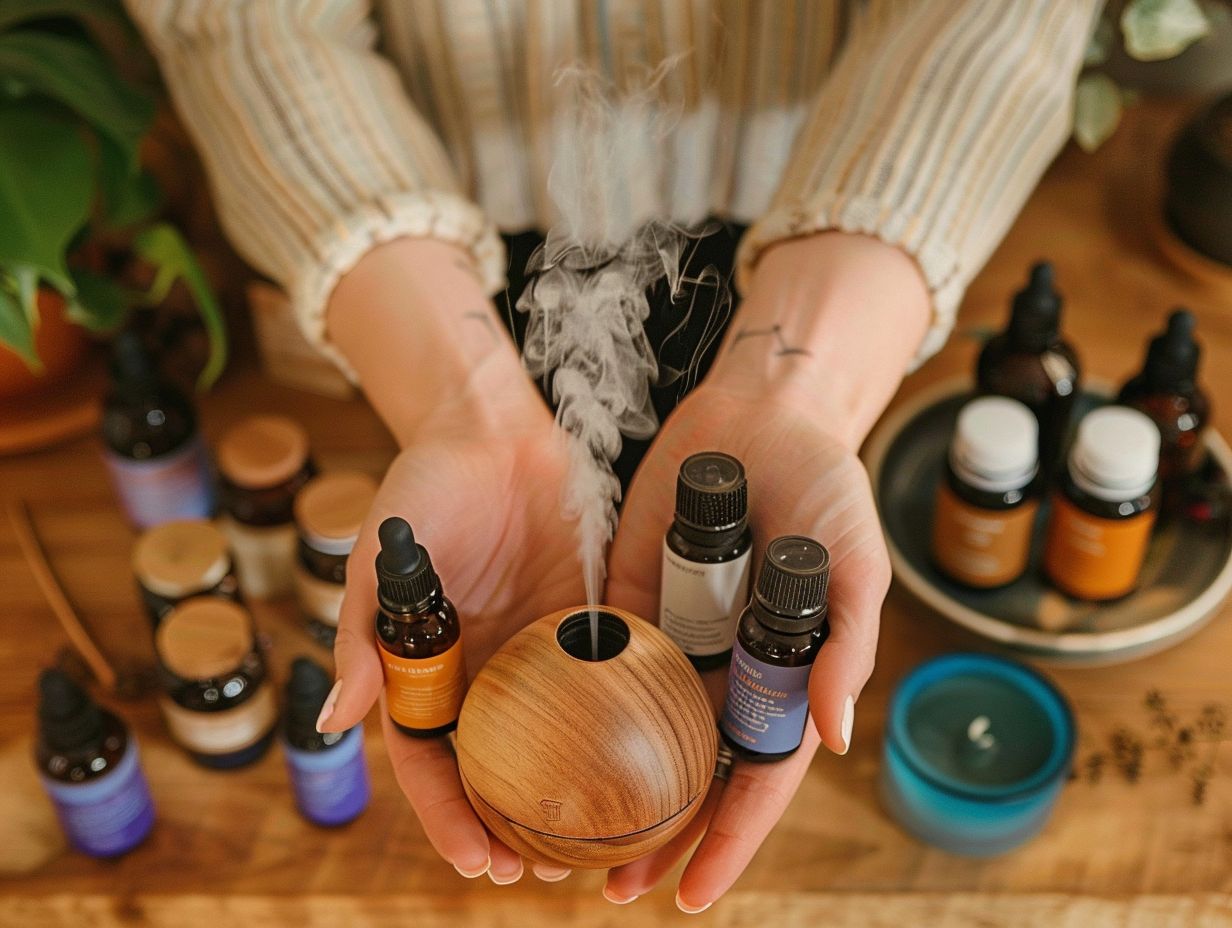
One popular method of utilizing tea tree oil for pain relief is through massage. When diluted with a carrier oil, tea tree oil can be gently rubbed onto the affected area to help alleviate discomfort and reduce inflammation.
Incorporating tea tree oil into an essential oil diffuser can offer a more systemic approach to managing pain and inflammation. The inhalation of tea tree oil vapor can have a calming effect on the body and mind, which may contribute to overall relaxation and relief from discomfort.
What Are the Different Types of Aromatherapy?
Aromatherapy encompasses various types of applications, including inhalation, topical application, and aerial diffusion. Each method offers unique ways to experience the benefits of essential oils.
Inhalation involves breathing in the aroma of essential oils, which can have a direct impact on the brain and nervous system. This method is often used through room sprays, diffusers, or steam facials.
On the other hand, topical application refers to applying diluted essential oils directly onto the skin, allowing for absorption. This can be beneficial for targeting specific areas of the body or for skincare purposes.
Aerial diffusion entails dispersing essential oils into the air, creating a pleasant atmosphere and potentially purifying the air in a space.
Inhalation
Inhalation is a common method of aromatherapy, where essential oils are diffused into the air and inhaled for their therapeutic benefits. This technique allows for quick absorption and direct impact on the respiratory system.
Direct inhalation is especially effective in targeting specific respiratory issues, such as congestion or sinusitis, providing almost immediate relief. When essential oils are inhaled, they travel through the nasal passage and reach the lungs, supporting clearer breathing and promoting respiratory health.
Diffusers and room sprays are popular tools for delivering the benefits of inhalation therapy. Diffusers disperse essential oils into the air, creating a calming or invigorating atmosphere, depending on the oils used. Room sprays offer a more localized and instant burst of fragrance, perfect for refreshing spaces quickly.
Topical Application
Topical application involves diluting essential oils in carrier oils and applying them directly to the skin. This method allows for the absorption of oils through the skin, offering localized and systemic benefits.
Properly diluted essential oils in carrier oils create what is known as massage oils, which play a significant role in skincare routines. When using essential oils topically, it is crucial to consider individual skin sensitivities. Some oils may cause irritation or reactions, especially when applied neat or in high concentration.
By blending essential oils with carrier oils, such as jojoba, almond, or coconut oil, the risk of adverse skin reactions is reduced. Understanding the properties of different carrier oils can help tailor the blend to address specific skin concerns.
Aerial Diffusion
Aerial diffusion involves dispersing essential oils into the air using diffusers, allowing for a continuous and gentle release of aromas. This method is effective for creating a pleasant and therapeutic atmosphere.
Essential oil diffusers work by breaking down the essential oils into smaller molecules, which are then dispersed into the air as a fine mist. This process helps to maintain the integrity and therapeutic properties of the oils, ensuring maximum benefits.
Happiness essential oil diffused through these devices can positively impact mood and emotions, promoting feelings of relaxation and well-being. The calming scents can uplift the spirit, reduce stress levels, and aid in achieving mental clarity.
Diffusing oils in a room not only enhances the ambiance but also purifies the air by eliminating airborne pathogens, thus contributing to better respiratory health.
How to Do Aromatherapy at Home?
Aromatherapy can be conveniently practiced at home by choosing suitable essential oils, selecting appropriate application methods, ensuring proper dilution, and following safety precautions. Creating a calming environment with aromatherapy is easy and beneficial.
When incorporating aromatherapy into your daily routine, it’s essential to prioritize safety. Always refer to reputable sources like the National Association for Holistic Aromatherapy for guidelines and best practices. Diluting essential oils properly is crucial to prevent skin irritation and adverse reactions.
Whether you prefer using essential oils in a diffuser, in homemade bath & body products, or through massage, understanding the dilution ratios will help you reap the full benefits of each oil. Tailoring your selection of essential oils to your needs and preferences is key to maximizing the therapeutic effects of aromatherapy.
Choose Your Essential Oils
Selecting the right essential oils is crucial for effective aromatherapy. Consider your desired benefits, personal preferences, and any potential sensitivities when choosing oils for home use.
Aromatherapy involves the use of essential oils extracted from plants to promote physical and psychological well-being. Assessing your own scent preferences can guide you towards oils that evoke positive emotions or relaxation, such as the invigorating peppermint or the uplifting orange. Each essential oil offers unique therapeutic benefits – for example, lavender for calming effects or eucalyptus for congestion relief. It s essential to research the properties of different oils to ensure they align with your wellness goals and health conditions.
Decide on a Method of Application
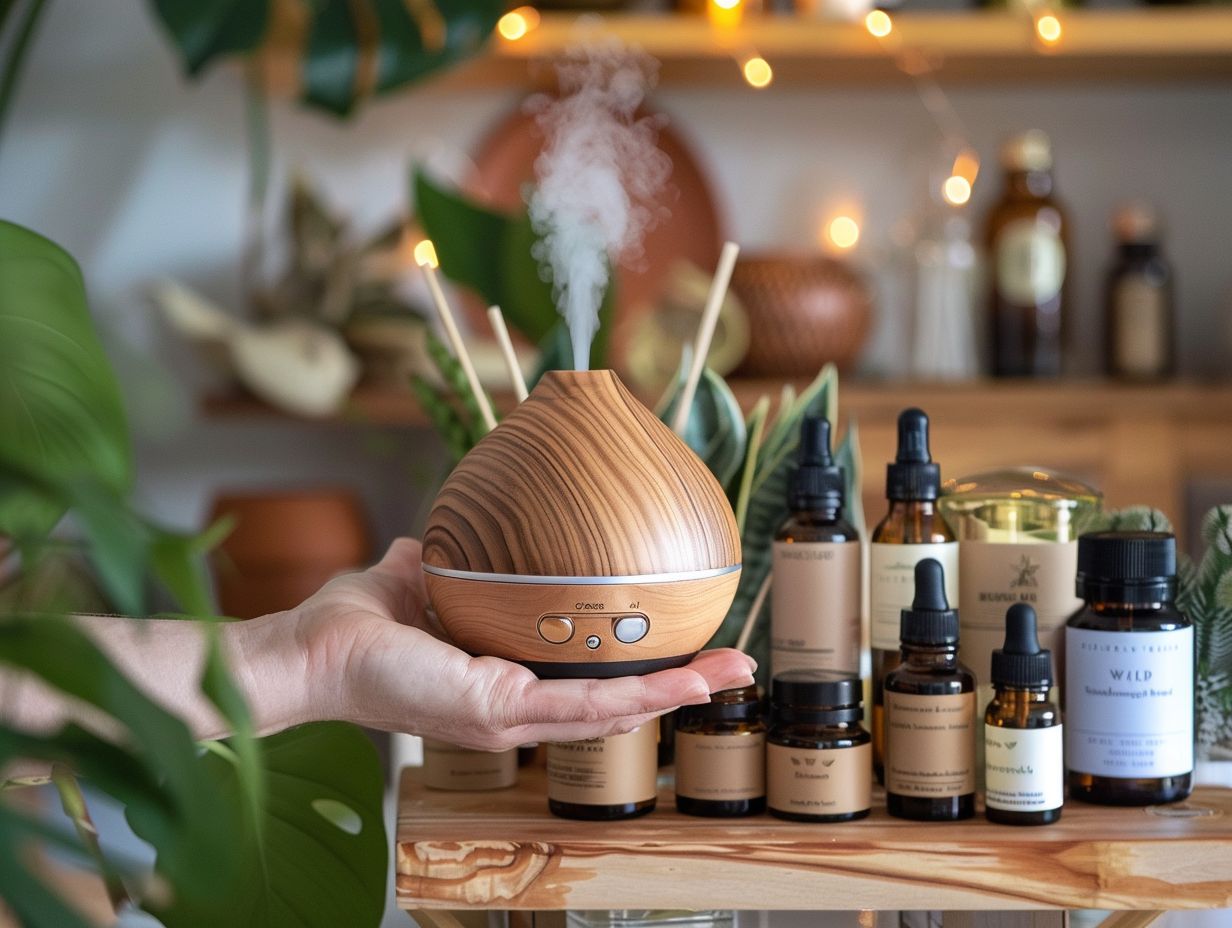
Determining the appropriate method of application is essential in aromatherapy. Whether you opt for inhalation, topical application, or diffusion, choosing the right method can enhance the benefits of essential oils.
Inhalation is a popular method that involves breathing in the aromatic vapors directly, allowing for quick absorption into the bloodstream.
Topical application, on the other hand, involves diluting essential oils with a carrier oil and applying the mixture to the skin for targeted relief.
Diffusion, through devices like nebulizers or diffusers, disperses the oils into the air for a soothing and therapeutic atmosphere.
Pulse point rollers are handy for on-the-go relief, while the BeYou Pillow Spray is perfect for enhancing relaxation during sleep.
Use Proper Dilution
Proper dilution of essential oils is essential for safe and effective aromatherapy. Dilute concentrated oils with carrier oils to reduce skin sensitivities and ensure optimal absorption of the plant extracts.
When using essential oils like lavender or My Viv Bergamot Oil, it’s crucial to follow specific dilution ratios. A general rule of thumb is to use 1-3% essential oil in a carrier oil for adults, while the ratio should be even lower for children and those with sensitive skin. Carrier oils such as jojoba, coconut, or almond oil make excellent choices for dilution, helping to prevent potential skin reactions or irritation. Always perform a patch test before applying diluted oils to a larger area to ensure compatibility with your skin.
Follow Safety Precautions
Practicing aromatherapy safely involves following essential precautions such as conducting skin patch tests, storing oils properly, and avoiding direct contact with sensitive areas like eyes and mucous membranes. Safety is paramount in enjoying the benefits of aromatherapy.
Regarding skin testing, it’s crucial to apply a diluted form of the essential oil on a small patch of skin and wait for any adverse reactions. Proper storage of oils is vital to maintain their efficacy; tea tree oil, for example, needs to be kept in a cool, dark place to prevent oxidation.
Always remember to keep essential oils out of reach of children and pets, as ingestion can be harmful. Using a Cowshed Relax Candle for aromatherapy? Make sure to trim the wick regularly and never leave it unattended.
What Are Some Popular Essential Oils for Aromatherapy at Home?
Several essential oils are popular choices for aromatherapy at home, including lavender, peppermint, eucalyptus, lemon, and tea tree oils. These oils are versatile and offer a wide range of therapeutic benefits.
Each of these essential oils has distinct characteristics and benefits that cater to various needs.
- Lavender oil is known for its calming properties, making it ideal for relaxation and stress relief.
- Peppermint oil is often used for its invigorating scent and ability to promote focus and mental clarity.
- Eucalyptus oil is popular for its respiratory benefits, aiding in congestion relief and promoting easier breathing.
Lemon oil is refreshing and uplifting, commonly used to boost mood and energize the mind. Tea tree oil, with its powerful antibacterial properties, is favored for skincare, helping to combat acne and other skin conditions.
Lavender
Lavender essential oil is a versatile oil known for its calming and relaxing properties. It is commonly used in aromatherapy to promote sleep, reduce anxiety, and create a soothing environment.
When looking to unwind after a long day, adding a few drops of lavender essential oil to a warm bath can work wonders in helping you relax. The gentle aroma of lavender can help calm your mind and reduce stress, making it an ideal choice for a soothing bath experience.
Using a few drops in a NEOM Wellbeing Pod can fill your living space with a serene fragrance, perfect for unwinding before bedtime. This versatile oil is not only great for relaxation but also promotes overall well-being by supporting a restful night’s sleep.
Peppermint
Peppermint essential oil is known for its invigorating and energizing properties. It can help boost mental clarity, enhance focus, and provide a refreshing aroma for an energy boost.
Many people rely on the fresh scent of peppermint oil to kick-start their day and stay alert during long working hours. This essential oil is a popular choice for those seeking an all-natural way to improve concentration and productivity. The crisp fragrance of peppermint can also uplift the mood and create a sense of happiness, making it a versatile addition to aromatherapy blends. When combined with other oils like orange essential oil, peppermint can promote a harmonious blend of scents that invigorate the senses and provide a well-rounded experience for the mind and body.
Eucalyptus
Eucalyptus essential oil is renowned for its respiratory benefits, making it ideal for aromatherapy targeting congestion relief, cough suppression, and sinus clearing. Its refreshing scent promotes easy breathing and relaxation.
One key way to enjoy the benefits of eucalyptus essential oil is through aromatic diffusion using diffusers. This method allows the oil to disperse in the air, creating a soothing atmosphere that can help clear nasal passages and ease breathing difficulty. Incorporating eucalyptus essential oil in a steam facial can provide localized relief for sinus congestion and help open up airways for improved breathing. The decongestant properties of eucalyptus oil can offer significant relief from respiratory issues by reducing inflammation and mucus buildup.
Lemon
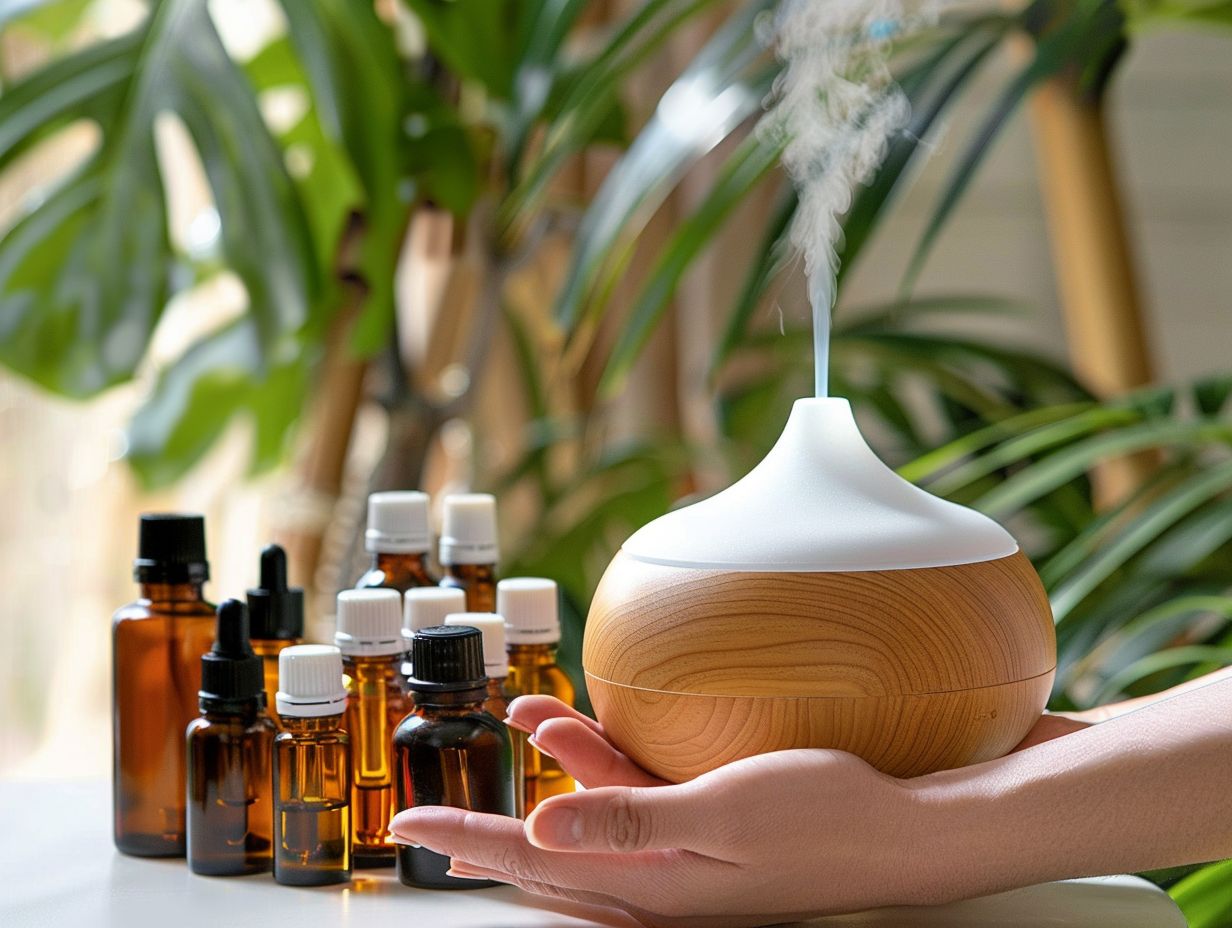
With its citrusy aroma, lemon essential oil is known for its ability to alleviate stress and anxiety, promoting a sense of relaxation and positivity. Plus its emotional benefits, this essential oil is also praised for its cleansing properties, beneficial for purifying the air in living spaces. When diluted properly, it can be used topically to boost skin radiance, but it is essential to perform a patch test first due to potential skin sensitivities. Incorporating lemon essential oil into a rejuvenating massage can help invigorate both body and mind, offering a refreshing and energizing experience.
Tea Tree
Tea tree essential oil is known for its antibacterial and antifungal properties, making it a versatile oil for aromatherapy at home. It can be used to promote skin health, alleviate acne, and support immune function.
Derived from the leaves of the Melaleuca alternifolia plant, tea tree essential oil has been traditionally used for its cleansing and soothing properties. Its anti-inflammatory nature can help calm skin irritations and reduce redness.
Tea tree oil is renowned for its ability to combat various skin issues like eczema, psoriasis, and dermatitis due to its antimicrobial effects. When mixed with a carrier oil, such as coconut or jojoba oil, it can be applied topically to retain moisture and hydrate the skin.
Frequently Asked Questions
Can You Do Aromatherapy at Home?
Yes, you can definitely do aromatherapy at home. In fact, it is one of the easiest and most convenient ways to enjoy the benefits of aromatherapy.
What is Aromatherapy?
Aromatherapy is the practice of using essential oils extracted from plants to improve physical, emotional, and spiritual well-being.
How Do You Do Aromatherapy at Home?
There are several ways to do aromatherapy at home, including diffusing essential oils, adding them to bathwater, using them in massage oils, or making homemade cleaning or beauty products with them.
What Are the Benefits of Aromatherapy at Home?
Aromatherapy can have a variety of benefits, such as reducing stress, improving sleep, promoting relaxation, boosting mood, and easing physical ailments like headaches or muscle tension.
Are There Any Precautions to Take When Doing Aromatherapy at Home?
While generally safe, some essential oils can cause irritation or allergic reactions. It is important to dilute them properly and do a patch test before using them topically. Also, pregnant or breastfeeding women should consult a healthcare professional before using essential oils.
Where Can You Get Essential Oils for Aromatherapy at Home?
There are many places to purchase essential oils, including health food stores, online retailers, and even some supermarkets. It is important to choose high-quality, pure essential oils for the best results.

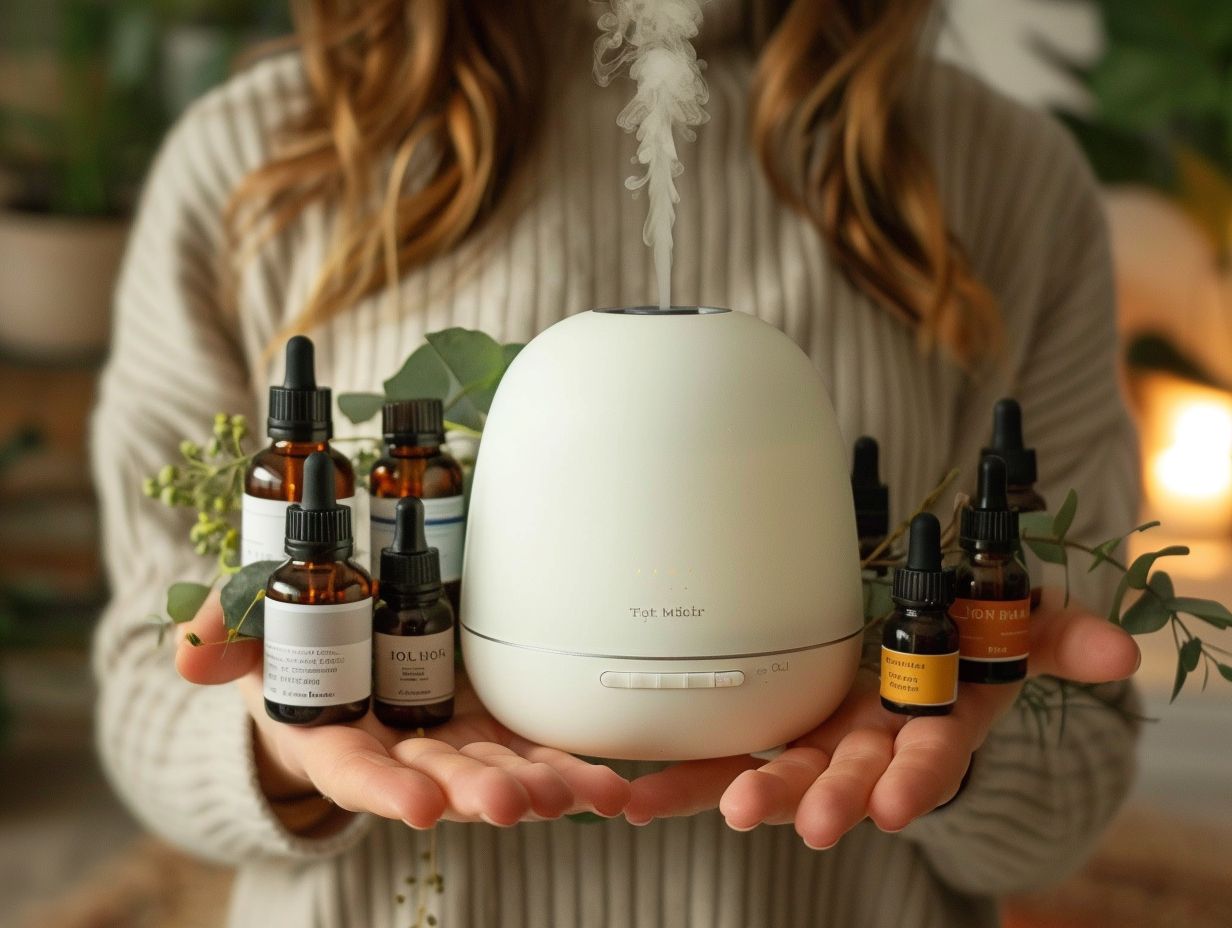
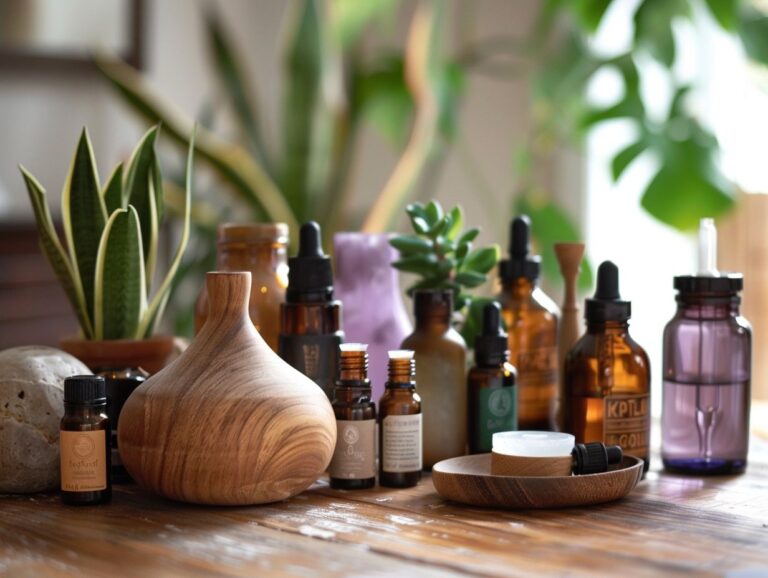
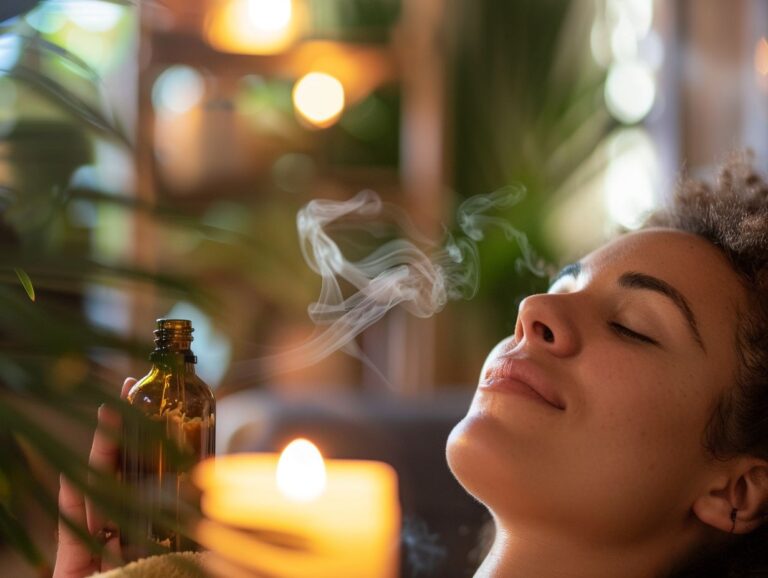
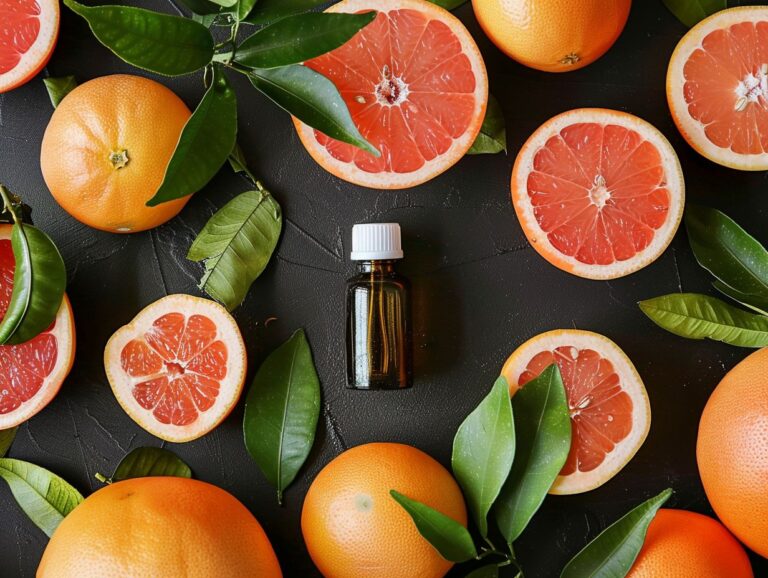
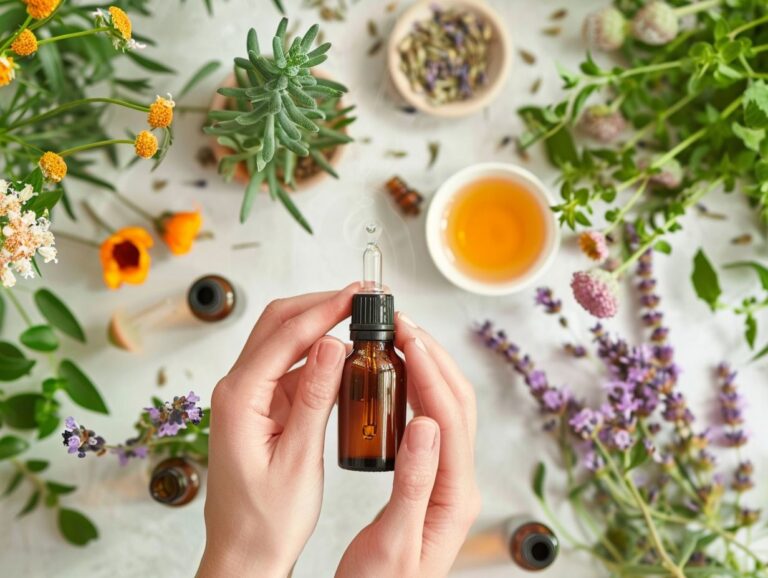

6 Comments